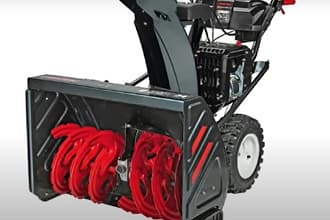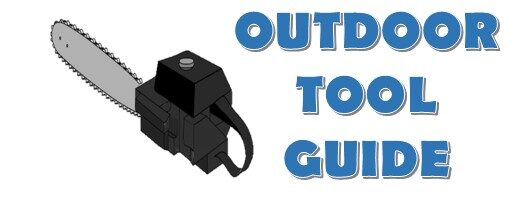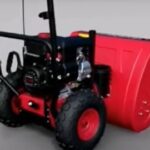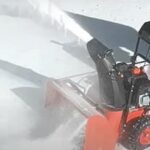As an Amazon Associate, this site earns commissions from qualifying purchases. For more information click here.
Wet snow is two to three times heavier compared to dry snow. It is stickier and in large volumes can take down branches. No question you need to get rid of it, but can a snow blower get wet? Will it work? That is what you will find out in this article.
A single stage snow blower can withstand a bit of wet snow. However you need a 2 or 3-stage snow blower if there is a lot of wet snow. You can leave a snow blower in the rain as long as it is properly covered up.
Can a Snow Blower Run in Wet Conditions?
You need a two or three-stage snow blower in these situations, and you must wear the appropriate clothing. Snow blowers clog up more easily in wet environments so you have to move slowly.
If you need a snow blower right now, the Power Smart PS24 212cc is our choice. It is built to handle dry and wet snow and is designed for heavy duty use.
Whether you opt for a 2 or 3-stage snow blower is a personal preference. A 3-stage snow blower comes with an accelerator for breaking ice, so that can be useful. In many cases though, a 2-stage snow blower is enough.
What you have to avoid is a single stage snow blower as it does not have enough power. Wet snow is heavier than dry and can quickly clog an under powered blower. So a heavy duty gas or electric model is ideal.
Once your snow blower is ready, turn it on and let it run. Use the snow blower as you normally would, and it should clear the snow. However, you have to advance slowly because the wet conditions make it harder for the blower to move.
How Does Wet Snow Affect Snow Blower Performance?
How well a snow blower runs in wet conditions depends on many factors. The amount of snow, type of snow and what kind of snow blower being used.
Snow blower type. As explained earlier, a 2 or 3 stage snow blower is required for heavy, wet snow. A single stage snow blower does not have the capacity to handle it. A 2 or 3 stage model has greater capacity and will get more work done.
For light snow, a single stage snow blower is fine. If the snow is more than 10 inches deep or wet, use a 2 or 3 stage type
One thing to keep in mind: wet snow can be 2-3 times heavier than dry snow. This cuts the capacity of any snow blower by a significant margin. Even if you have a powerful dual stage model, do not expect its capacity to match dry snow.
One way to improve performance is to let the snow blower idle for a few minutes when you start it up. Then let it idle also before shutting it off.

Do Snow Blowers Work in the Rain?
Snow blowers will run in rainy weather. Note that the starters on some of these require dry conditions. In that case, just turn the snow blower on in your garage and then take it outside. This is why we like the 212cc Power Smart PSSW21 because it can work in the rain and is easy to use.
There are a few more things you should keep in mind when using a snow blower in the rain.
If you are using a corded electric snow blower, make sure the cord is long enough to cover the distance you have to go over. It is not advisable to use electric snow blowers – or any corded electric tools – outside when it rains. If the cord gets wet there is a greater risk of electrocution.
Cordless snow blowers do not have any issues with cords, but the biggest question is how much power is available. Make sure the blower is fully charged and has the capacity to handle rain and wet snow. A 2 or 3-stage snow blower is also ideal when clearing packed and wet snow.
If the operating manual says the snow blower runs in the rain, there should be no issues. But there are things you need to consider.
Using a snow blower in the rain is difficult. The surface becomes slippery, making it hard for you and the machine to navigate. If the rain is pouring it can be hard to see as well. When the rain falls to the ground it solidifies into ice, making the surface risky to walk on.
Bottom line is that most snow blowers will run fine in rainy weather, but it gets difficult to use. Heavy rain also increases the chances of you slipping and falling. It is better to wait for the rain to stop before proceeding.
Can You Leave a Snow Blower Outside?
You can leave a snow blower outdoors if it is not raining. If there is rain or snow, cover it with a tarp. If you don’t, the engine will get damaged from the water or freeze.
The best option is to store your snow blower in the garage. Before you do so, allow the engine to cool down. Just to be sure, put a water resistant cover on top of the blower.
Do not store a wet snow blower in the garage. Dry it thoroughly first. If you do not do this, the water will dissipate and produce moisture. If it is freezing in the garage the water will turn into ice.
Even if it is warm in your garage, it is still a good idea to dry your snow blower. Water left in the machine could lead to rusting. To keep your garage dry, put a canvas under the snow blower to absorb the water.
If you just finished using your snow blower in the rain, wipe it thoroughly. This is especially important if the blower is electric as water and electricity should never mix.
Common Wet Snow Blower Problems and Solutions
Even if you have a powerful snow blower, you could still run into some problems. There are many kinds of problems that can arise but the most likely to be affected are the carburetor, auger and chute. Too much moisture can also lead to rust.
Rust
While snow blowers are built for use in snow, it can still cause rust. Snow contains salt which corrodes metals. If the machine is heavily exposed to salt and moisture, its protective coating will wear off. Without protection, water is going to get into the machine and cause damage.
The best way to prevent this is with regular maintenance. Wipe and clean your snow blower thoroughly after use. Maintenance plays a huge role in prolonging the lifespan of any power tool. If some parts do get worn out, replace them as soon as possible.
Carburetor Freezing
In wet conditions, the moisture can seep into the carburetor and cause condensation. At the very least the carburetor will stutter, in the worst case scenario the engine stops working.
A temporary fix is to run the snow blower with the choke. A better solution is to put a baffle to reduce the sputtering and shaking.
Damaged Chute and Auger
Heavy snow and wet conditions can take its toll on a snow blower. If the auger and/or the chute get clogged or frozen, the snow blower will halt. If the machine stalls, turn it off and check if there is clogging.
If your snow blower is always getting clogged, you probably need an upgrade. Look for a dual stage snow blower with an impeller fan and robust augers. More importantly, the snow blower must be designed to handle wet snow and conditions.
Important: do not use your hands to remove auger or chute clogging. Shut the snow blower down and wait for the engine to cool first. Then use a stick or a similar tool to clean the auger and/or chute.

I love the outdoors and all the tools for maintaining gardens, yards and lawns. The only thing I am more passionate about is sharing what I know about garden and outdoor equipment.


